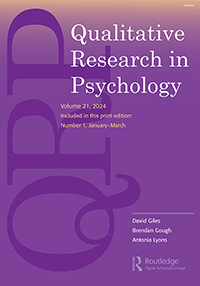What does effective allyship between social work and lived experience workers look like in the Australian forensic mental health context?
IF 4.4
3区 心理学
Q1 PSYCHOLOGY, MULTIDISCIPLINARY
引用次数: 7
Abstract
ABSTRACT While forensic social work has a long history, it continues to struggle with its identity within a multidisciplinary team environment. Some jurisdictions have witnessed the development of informal partnerships between social work teams and lived experience workers, but little is known about their operation. Against this background, the aim of this project was to explore the presence, nature and operation of these partnerships in forensic mental health services. Social workers and lived experience workers from Australia and New Zealand attended a two-day summit to share practice-based experiences and engage in small group discussions. The Summit identified both a range of service models across forensic mental health services, and a keen interest in amassing practice-based wisdom to enable more formalised partnerships between social work and lived experience workers. Recommendations arising can be used as a platform to shape the future development and directions of allyship in forensic mental health practice.在澳大利亚法医心理健康背景下,社会工作和生活经验工作者之间的有效联盟是什么样的?
虽然法医社会工作有着悠久的历史,但它仍然在多学科团队环境中与自己的身份作斗争。一些司法管辖区见证了社会工作团队和生活经验工作者之间非正式伙伴关系的发展,但对其运作知之甚少。在此背景下,该项目的目的是探讨这些伙伴关系在法医心理健康服务中的存在、性质和运作。来自澳大利亚和新西兰的社会工作者和生活经验工作者参加了为期两天的峰会,分享基于实践的经验,并进行小组讨论。首脑会议确定了法医精神卫生服务的一系列服务模式,以及对积累基于实践的智慧的浓厚兴趣,以便在社会工作和有实际经验的工作者之间建立更正式的伙伴关系。所产生的建议可作为一个平台,以塑造法医精神卫生实践中盟友关系的未来发展和方向。
本文章由计算机程序翻译,如有差异,请以英文原文为准。
求助全文
约1分钟内获得全文
求助全文
来源期刊

Qualitative Research in Psychology
PSYCHOLOGY, MULTIDISCIPLINARY-
CiteScore
20.00
自引率
0.50%
发文量
14
期刊介绍:
Qualitative Research in Psychology is an international, peer-reviewed journal that publishes high-quality, original research. It aims to become the primary forum for qualitative researchers in all areas of psychology, including cognitive, social, developmental, educational, clinical, health, and forensic psychology. The journal also welcomes psychologically relevant qualitative research from other disciplines. It seeks innovative and pioneering work that advances the field of qualitative research in psychology.
The journal has published state-of-the-art debates on various research approaches, methods, and analytic techniques, such as discourse analysis, interpretative phenomenological analysis, visual analyses, and online research. It has also explored the role of qualitative research in fields like psychosocial studies and feminist psychology. Additionally, the journal has provided informative articles on ethics, transcription, interviewee recruitment, and has introduced innovative research techniques like photovoice, autoethnography, template analysis, and psychogeography.
While the predominant audience consists of psychology professionals using qualitative research methods in academic, clinical, or occupational settings, the journal has an interdisciplinary focus. It aims to raise awareness of psychology as a social science that encompasses various qualitative approaches.
In summary, Qualitative Research in Psychology is a leading forum for qualitative researchers in psychology. It publishes cutting-edge research, explores different research approaches and techniques, and encourages interdisciplinary collaboration.
 求助内容:
求助内容: 应助结果提醒方式:
应助结果提醒方式:


